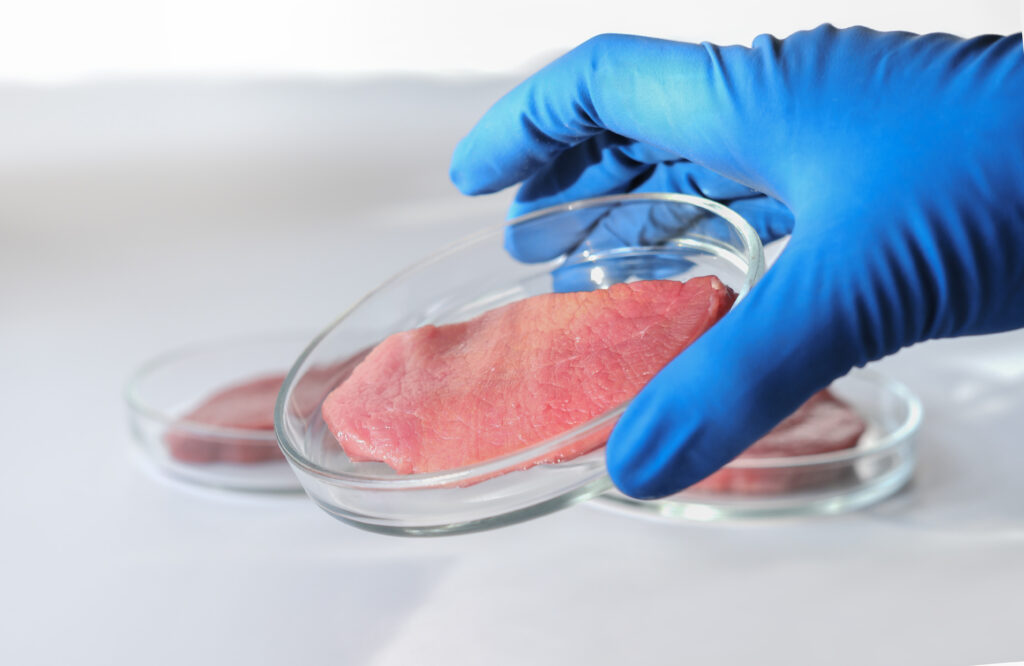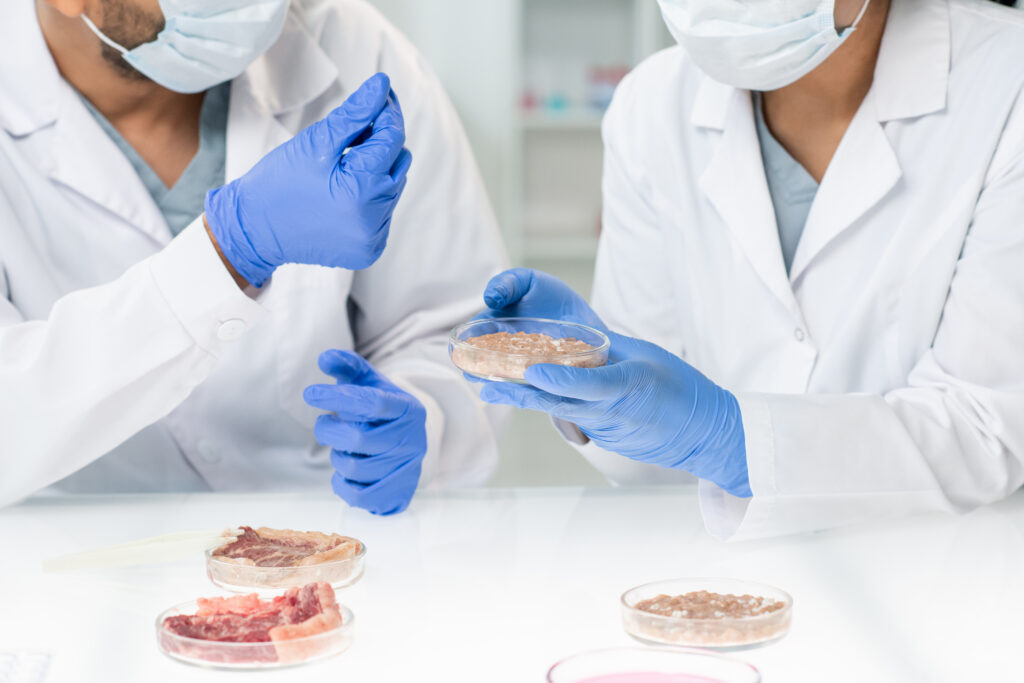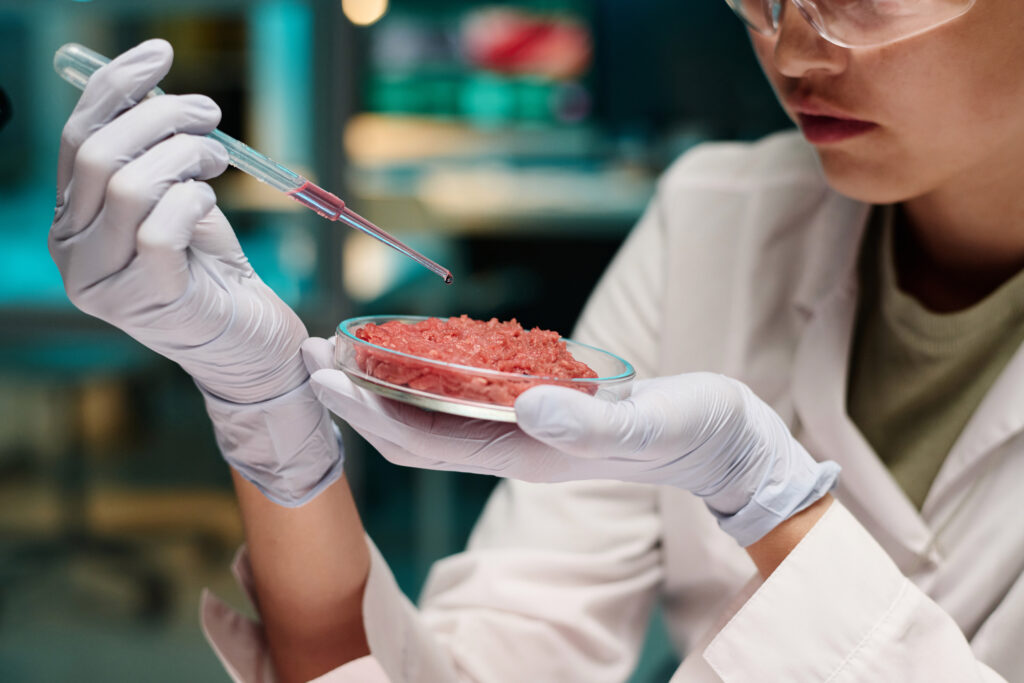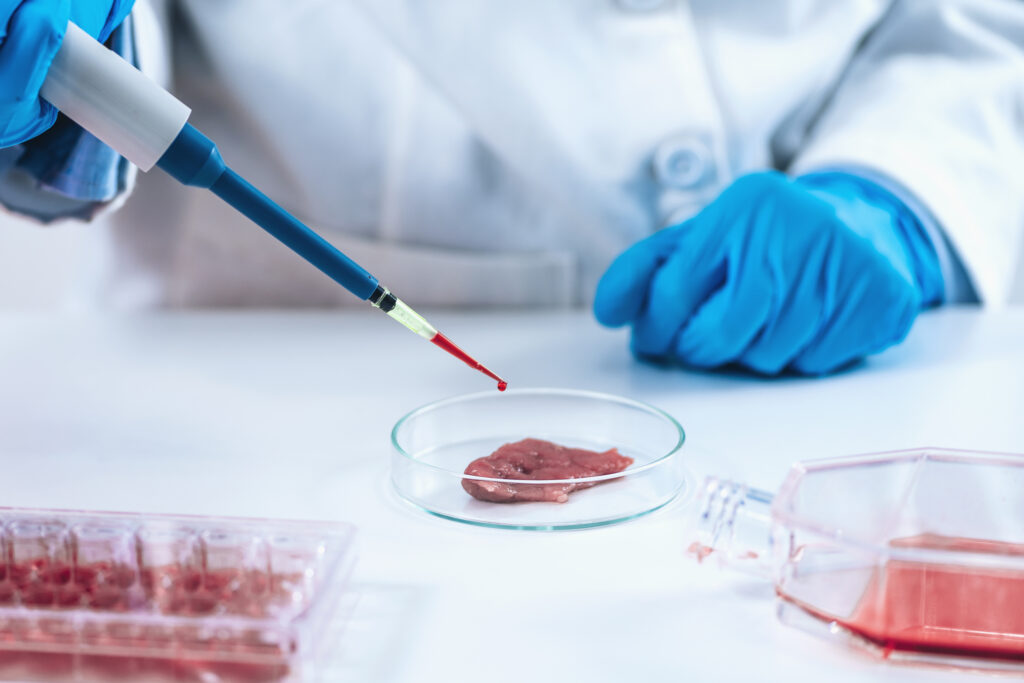Can Lab-Grown Meat Be Halal: A Religious and Ethical Debate
Lab-grown meat —an innovation poised to revolutionise the meat industry —stands at the crossroads of science, ethics, and religion. The quest to determine its compatibility with Halal standards has sparked discussions among scholars, industry players, and consumers worldwide.
21 January 2024
Share this exclusive content from Saladplate

Photo Credit:Yulia Panova on Envato Elements
At its core, lab-grown meat offers a sustainable and ethical alternative to conventional meat production. Yet, its acceptance within the Halal framework hinges on meticulous adherence to Islamic principles. The fundamental question revolves around the source of cell lines and the processes involved in their creation.
Cultivated meat is currently only sold in tiny quantities in the United States and Singapore, but there is hope to scale production and alter diets globally. Middle Eastern food tech company Aleph Farms, headquartered in New York, seeks to be the ‘first halal-certified’ cultivated meat firm. It wants to offer Muslim-majority ASEAN markets its halal products such as its cultivated steaks, which it grows directly from non-modified beef cells and is using Singapore as a springboard to the rest of the region. Similarly, GOOD Meat is producing cultivated chicken, which both Singapore and the United States have approved for sale – they are also seeking a ruling on their products and an “international acceptance of cultivated meat since halal consumers represent about 25% of the world’s population.”
According to the Good Food Institute, a think tank, the U.S. drew $6.78 billion in alternative protein investment from 2020 to 2022, followed by Israel at $1.19 billion. During the same period, China received $210 million while Singapore pulled in $300 million.
Using cellular agriculture technology, Aleph’s cuts take approximately four weeks to grow. The cells for its first cultivated Petit Steak come from a single cow. The meat is derived from a sample of animal cells that are fed a nutrient mix and grown in steel vats, avoiding the need for land-intensive industrial farming operations and slaughterhouses.

Photo Credit: Pressmaster on Envato Elements
Lab-grown meat process
Lab-grown or “cultured” meat is crafted from authentic animal cells and cultivated in bioreactors. This distinguishes it from plant-based meat, exemplified by products from Beyond Meat, which primarily consist of ingredients like pea and soy protein.
Lab-grown meat begins with a fertilised egg sourced from a cow, allowing it to develop briefly before extracting cells. These starter cells are then transferred to a growth tank, providing an optimal environment for growth with essential nutrients. The cells mature into various types of muscle and collagen in separate cultivators. After approximately four weeks, the lab-grown cuts are harvested and prepared for culinary use.
Possibilities towards labeling lab-grown meat as Halal
According to scholars consulted by industry pioneers like Aleph Farms and GOOD Meat by Eat Just, lab-grown meat could bear the Halal label IF certain criteria are met which include cells utilised must originate from animals slaughtered in compliance with Islamic law. This also extends to the nutrients provided to nurture these cells.
Despite recent approvals, it’s still uncertain if consumers will recognise lab-grown meat as halal and may depend on the religious authorities they follow and their level of observance. Additionally, to reach a wider audience, the industry will have to find a way to make its meat more palatable: A 2022 study found that about 55 per cent of vegetarians and 35 per cent of meat-eaters would not be open to trying cultivated meat.

Photo Credit: Anna Stills on Envato Elements
The intricacies of Halal certification reveal a nuanced landscape.
While some scholars opine that the cells derived from biopsies or non-living animal parts—like feathers or wool—could comply with Halal tenets, others argue that the source animal’s initial handling is of prime importance. For instance, cells procured from a recently slaughtered animal might warrant consideration for Halal certification, presenting a potential solution within Islamic guidelines.
The challenge lies in achieving consensus across religious authorities. The impact of these deliberations extends beyond religious adherence; it touches on global food security, environmental sustainability, and the future of protein consumption. Lab-grown meat’s potential to reduce environmental impact aligns with Islamic principles—a facet that resonates with individuals seeking ethical dietary choices.

Photo Credit: Microgen on Envato Elements
The Halal certification of lab-grown meat is significant as it could potentally cater to a quarter of the world’s population adhering to these dietary guidelines. The discussions on lab-grown meat’s Halal status reflect a convergence of modern innovation and timeless religious principles—a delicate balance that necessitates meticulous attention to detail, ethical considerations, and a convergence of diverse perspectives to pave the way for a universally acceptable solution.
Right now, it’s a work in progress.
Author: Pooja Thakur
Pooja Thakur is a senior journalist, writer, and editor with over 20 years of experience in print and digital media and in creating custom content for periodicals. She has been a long-serving senior reporter at Bloomberg News covering areas such as real estate, stocks and personal finance and inventing across markets with a focus on Southeast Asia and India. In her free time, she enjoys scuba diving, rucking and finding the newest watering hole in town.



